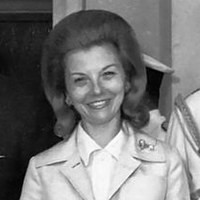La Rioja (Argentina), 1931
By María Seoane
María Estela Martínez Perón, Isabelita, was born on February 4, 1931, in the province of La Rioja. In 1955, she met Juan Domingo Perón and became his personal secretary. She accompanied him into exile, and they married in 1961 in Madrid. When Perón returned to Argentina in 1973, he appointed her to join the presidential ticket for the September 23 elections of that same year, in which they triumphed. She served as vice president until July 1, 1974, when she assumed the presidency following Perón’s death. She faced severe issues related to inflation, corruption, and violence. After several troubling incidents involving her Minister of Social Welfare, José López Rega, she took a medical leave of absence from September 13 to November 6, 1975. During this time, she delegated her duties to the president of the Senate, Ítalo A. Luder. She resumed power despite constant pressure from the Armed Forces and public opinion. On March 24, 1976, Emilio Massera, Jorge Rafael Videla, and Orlando Ramón Agosti led a military coup, beginning the self-proclaimed “National Reorganization Process.” Isabelita was arrested and imprisoned until 1981, when she went into exile in Spain.
In January 2007, the federal judge of San Rafael, Mendoza, Argentina, requested the arrest of Isabelita through Interpol, accusing her of the 1975 disappearance of Héctor Fagetti Gallego, who was 26 years old at the time, and the illegal detention of Jorge Verón, then 17 years old. The actions were allegedly a result of decrees signed by the former president on October 6 of that year, in which she ordered to “neutralize or annihilate the actions of subversive elements.” On January 12, 2007, Isabelita was arrested by the Spanish National Police in Madrid and brought to a hearing, where she refused to be extradited to Argentina. She was then released on bail and required to report to court every fifteen days while the formal extradition process was initiated. In April 2008, the Spanish judiciary ruled that the alleged crimes attributed to Isabelita were time-barred and did not constitute crimes against humanity, which are not subject to statutes of limitation. Therefore, Spain rejected the extradition request.



